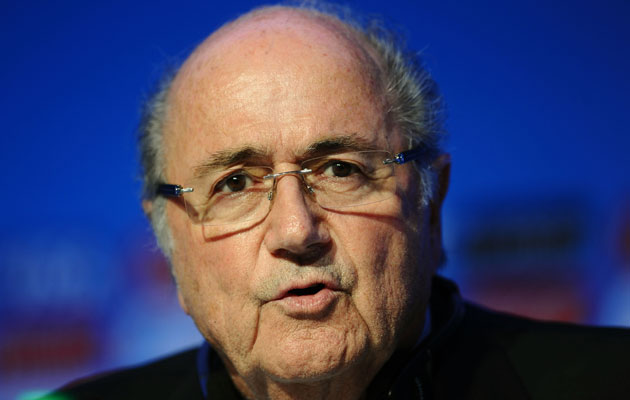Europe wheeled out its big guns here in the plush five-star hotels of Sao Paulo to bring Sepp Blatter’s triumphal tour of his kingdom to a shuddering halt.
Whether this will make any difference next year, when he pursues a fifth term as president of world federation FIFA is doubtful. One of the difficulties is that UEFA does not have a candidate and will certainly not support the one declared contestant, fomer FIFA dputy general secretary Jerome Champagne.
But delegates of UEFA’s 54 member associations – led by Holland’s Michael Van Praag and England’s Greg Dyke – expressed to his face their loss of confidence in his leadership and their anger at his betrayal over a promise to step down in 2015.
Previously Blatter had been garlanded with obsequious praise and standing ovations in the mini congresses of Africa, Asia, South America, central/North America and Oceania. But his lap of honour ended abruptly with a European ambush.
UEFA president Michel Platini welcomed Blatter to the conference and he explained how he had changed his mind about the retirement he had promised at UEFA’s Congress back in the spring of 2011. It was that promise which had persuaded UEFA not to run a candidate against him.
Now, said Blatter, he had changed his mind, as “every human being had the right to do.”
This time there was no standing ovation, only controlled anger.
Van Praag, a member of the UEFA executive and possible candidate to run against Blatter, led the way in no uncertain terms.
The Dutchman said later: “I said to him that I liked him very much so this was nothing personal but the reputation FIFA had built in the last seven or eight years meant people linked FIFA to corruption, bribery, old boys network things.
“I told him: ‘FIFA has an executive president and having an executive president means that at the end you are responsible and, besides, you don’t make it easy on yourself. Now you say that Qatar was the wrong choice which means you blame your executive committee and yesterday you said something about racism.
“‘So people tend not to take you seriously any more. That is not good for FIFA, not good for the game, not good for the world.
“”Yes, so you are leading the reforms but all these problems occurred in the period before that when you were also the president and responsible so I believe you should not run any more.'”
Reiterating his point later Van Praag said: “Whether you like it or not, an executive president bears responsibilities, for better or worse. It’s part of the job . . . and so for him and for FIFA it’s better that he does not continue.”
Dyke then stood up and rebutted Blatter’s attack on the British media and further denunications of Blatter after the meeting came from Norway’s Karen Espelund – a long-time critic dating all the way back to the 2002 Congress – and German federation president Wolfgang Niersbach.
Espelund complained that FIFA needed to put football back at the “core of our business” while Niersbach excoriated Blatter for breaking his word, given to UEFA in Paris in 2011, about his intention to retire in 2015.
Gianni Infantino, UEFA’s general secretary, noted that “there is no storm in football there is only a storm in FIFA.”
The problem for UEFA is that any candidate appears to be on to a certain loser given the weight of support he has corralled in the other five regional confederations.
Also, not only will UEFA not have a candidate but its own ‘preferred candidate’, Platini, is unlikely to want to stand. Platini will announce his decision in early September and only then can his federation whether to put up a sacrificial lamb or not even give Blatter the satisfaction of defeating one of them.







